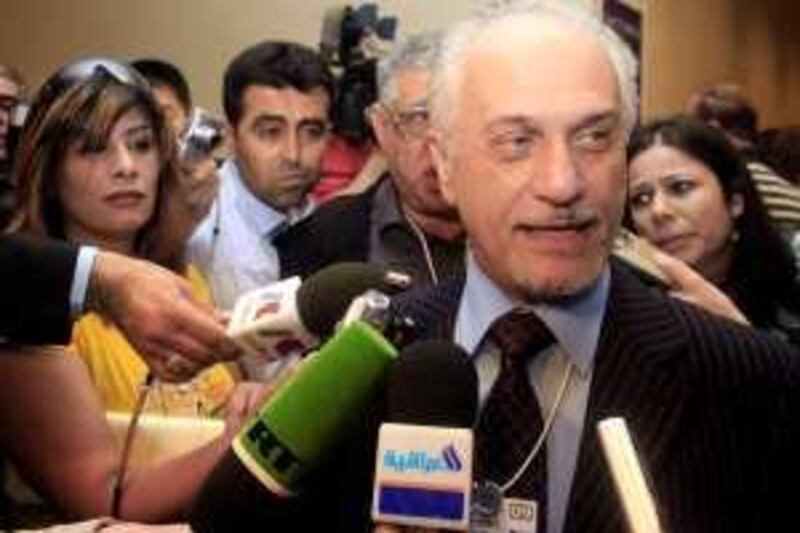BAGHDAD // Development rights for some of Iraq's largest oil fields are to go up for auction tomorrow despite ongoing concerns about government mismanagement and corruption. Leading international firms, including Shell and Exxon, are expected to enter bids even as a parliamentary watchdog continues to investigate the handling of contracts by Iraq's oil minister, Hussain al Shahristani. Calls by parliamentarians to suspend the rights auction until after the inquiry is completed have been rejected by the government
The oil ministry has come in for intense scrutiny because of the sums of money involved. Some US$9 billion (Dh33bn) in public funds has already been invested in Iraq's ailing oil infrastructure but oil production is about 2.4 million barrels a day, less than it was before the 2003 invasion. However, it is not the only government ministry implicated in corruption, which has been singled out as a key concern by the prime minister, Nouri al Maliki. He has pledged a clampdown on fraud and graft, branding it as dangerous to the future of Iraq as the ongoing insurgency.
Iraq's parliament, with its various oversight committees, is playing a leading role in the anti-corruption push and has put pressure on a number of cabinet figures, including such key allies of Mr al Maliki as Mr al Shahristani, who faced questioning by politicians last week. "We will pursue each minister who is suspected of involvement in corruption and if there is evidence, they should be removed from office," Jabir Khalifa Jabir, secretary of the oil and gas committee, said in an interview.
"Iraq must be freed from corruption. Parliament will not stop its hunt for corrupt ministers because they will destroy Iraq, they aid the devastation we face." According to Mr Jabir, who spent more than 15 years working at the state-run Southern Gas Company, deals already concluded between the oil ministry and foreign firms illegally bypassed a requirement for parliamentary approval. The oil ministry insists it does not need parliament's permission.
In October 2007, the then chairman of Iraq's Public Integrity Commission, Radhi al Radhi, estimated that corruption had cost the country $18bn over the past three years. He also alleged that the Maliki government was blocking investigations and had protected corrupt officials. Under threat of death, Mr al Radhi was subsequently granted asylum in the United States. Parliament member Basim Sharif, who has called for tough anti-corruption measures, said theft and the misuse of government money had reached a "vast magnitude" and that top-level government members were implicated.
"I'm sure a number of ministers have packed their bags and made their arrangements to escape from Iraq now that parliament is seriously looking at this issue," he said. The former government trade and industry minister, Abdel Falah al Sudani, was detained last month as he tried to leave the country on a flight to the UAE. His aircraft was turned around and he was arrested at Baghdad airport. Mr al Sudani, a 62-year-old joint Iraqi-British citizen, was subsequently released on bail although he remains under investigation and has reportedly been barred from leaving the country until the case has been resolved.
Another former minister, Ayham al Samarraie, was jailed for corruption but escaped his prison cell in December 2006 and fled to the US, where he also holds citizenship. The former Defence Minister Hazem al Shaalan fled Iraq in 2005 and refused to return to face charges of a $1bn weapons procurement fraud. While the effort to clean up governmental departments has received wide public support, there are concerns the campaign will become a victim of Iraq's fractured politics, with various power blocs seeking to protect their own people, even if corrupt, and tarnish their rivals with false claims of wrongdoing.
Mr Sharif, the MP, cautioned that investigations must be evidence driven and not allowed to become politicised witch-hunts. He also urged senior figures not to use their influence to protect allies implicated in corruption. "I hope that political forces do not work to defend the corrupt, we need all of the parties to co-operate in bringing these criminals to justice," he said. "We do not need these corruption cases used for a settling of accounts between parties, this should not be about politics but about justice."
Mr al Maliki's own commitment to rooting out corruption has been questioned by his political opponents, who say he has moved years too late and taken action only when left with no alternative. Similarly, opposition groups say Mr al Maliki decided to investigate allegations of torture by government security forces only after pressure from parliament made it impossible for him to ignore the situation. Such claims are rejected by the prime minister, who has overseen the issuing of hundreds of arrest warrants against corruption suspects. Iraq's Commission on Public Integrity has said that 997 ministry officials are currently under investigation for corruption, including 53 ranked director general or higher. During the last two months, 120 Iraqis were arrested on corruption charges.
"All of these cases affect the Iraqi people and, if there is a case to answer, it must be done in an Iraqi court, before an Iraqi judge, under Iraqi law," said Sirwan Zahawi, a member of the parliamentary legal committee. "Even ministers should know that if there is evidence then there will be a trial." The corruption investigations are not universally supported however, with some MPs claiming that they undermine the government at a time when it is fighting an insurgency. That battle needs the united and undivided attention of officials, according to parliament member Haider al Sweidi.
"This process of questioning ministers is a reflection of the conflict between political parties and could create a new crisis that will adversely affect the security situation which has already begun to deteriorate," he said. "Because of that I am wary of bringing ministers before parliament in this way." nlatif@thenational.ae





